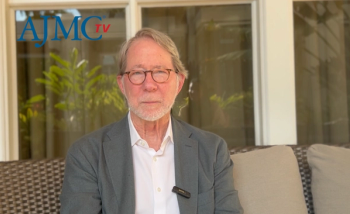
- December 2019
- Volume 25
- Issue 12
Empower Physicians to Fight Financial Toxicity With Biosimilars
The availability of biosimilars introduces competition based on price, offering a lower-cost alternative in the short term and helping to restrict—or even reverse—longer-term price growth.
Oncology practices see the toll financial toxicity1 exacts on patients and their families every day. The financial burdens of cancer treatment are damaging even when they don’t directly affect care—and research shows that all too often, they do. Patients struggling under the burdens of cancer care are more likely to be nonadherent with their prescribed treatment regimen, failing to fill prescriptions, delaying office visits, and forgoing critical diagnostic tests.2 More affordable care is better care, and payers should empower providers to steer patients toward superior-value options whenever available. When it comes to oncology biologics, this means giving providers the power to prescribe biosimilars.
Biosimilars offer lower-cost alternatives to the biologic agents driving up the cost of prescription drugs. Biologics accounted for nearly 75% of the annual increase in net US spending on medicines in 2018.3 The availability of biosimilars introduces competition based on price, offering a lower-cost alternative in the short term and helping to restrict—or even reverse—longer-term price growth. As a growing number of biologics used in oncology treatment, such as trastuzumab, encounter biosimilar competition, providers have the opportunity to significantly reduce prescription drug costs for their patients. Where biosimilars, which are certified as clinically equivalent by the FDA, are the correct treatment option, failure to prescribe them is a failure to address financial toxicity. Ultimately, it’s a failure to hold the oncology profession to the highest, most comprehensive standard of patient care.
Although provider education can play an important role in biosimilar uptake, in certain cases, patients’ insurers prevent providers from prescribing these products. Anticompetitive rebating practices (“rebate walls”) by originator manufacturers incentivize payers to adopt “fail-first” preferences for costlier originator drugs, eliminating a patient’s option to choose a lower-cost biosimilar when available. Because biosimilars are clinically equivalent, a fail-first policy preferencing an originator is an effective ban on coverage of its biosimilars. In a higher-profile case of rebate-induced limiting of patient and prescriber choice, UnitedHealthcare adopted a fail-first preference for Amgen originator biologic Neulasta over pegfilgrastim biosimilars Udenyca and Fulphila.4 This summer, the Federal Trade Commission initiated an investigation of Johnson & Johnson’s contracting practices surrounding infliximab originator Remicade, examining potential exclusionary conduct against Pfizer biosimilar Inflectra.5
Ironically, in October, UnitedHealthcare granted Amgen’s own oncology biosimilars, Mvasi and Kanjinti, preferred status on its commercial and community plan formularies. It seems payers do not have a formulary preference against all biosimilars, just those of manufacturers unable or unwilling to offer more attractive rebate contracts.6
Payers can argue that the savings from larger rebate packages accrue to the benefit of their entire insured population. However, any savings from contracts that exclude oncology biosimilars come at the direct expense of the patients who are forced to pay higher out-of-pocket costs for expensive originator biologics. It’s a cruel trade-off and one that denies physicians the ability to alleviate the financial toxicity of oncology treatment and harms the quality of care delivered to patients. Moreover, these policies inhibit the multiproduct biosimilar competition that can generate greater savings over time.
In May, the FDA finalized guidance on how biosimilars can achieve interchangeability, which would give pharmacists the ability to substitute them for originator biologics without the express guidance of the prescribing physician, as they can for small molecule generics.7 Although this is a step in the right direction, it won’t extend full biosimilar access for patients being treated today or for some time in the future. Today, however, payers have the option to simply do the right thing, rejecting attempts to block biosimilar access and respecting physicians’ ability to prescribe as they know best. If only they’re allowed to compete on a level playing field, biosimilars may hold the key to savings for patients struggling with financial toxicity. The oncology provider community should demand better, making clear that antibiosimilar formulary policies infringe on providers’ ability to offer care in a manner that promotes the best outcomes for our patients.Author Information
Kathy Oubre, MS, is the chief operating officer of Pontchartrain Cancer Center, with locations in Covington and Hammond, Louisiana.References
1. Zafar SY, Abernethy A. Financial toxicity, part I: a new name for a growing problem. Oncology (Williston Park). 2013;27(2):80-81, 149.
2. Knight TG, Deal AM, Dusetzina SB, et al. Financial toxicity in adults with cancer: adverse outcomes and noncompliance. J Oncol Pract. 2018;14(11):e665-e3673. doi: 10.1200/JOP.18.00120.
3. Medicine use and spending in the US: a review of 2018 and outlook to 2023. IQVIA website. iqvia.com/insights/the-iqvia-institute/reports/medicine-use-and-spending-in-the-us-a-review-of-2018-and-outlook-to-2023. Published May 9, 2019. Accessed November 19, 2019.
4. Owens C. How a cheaper prescription drug is getting boxed out. Axios website. axios.com/drug-prices-nulestaudenyca-cancer-unitedhealth-6bca53af-0ec1-45fb-a373-ec57d6ea7b0c.html. Published June 3, 2019. Accessed November 19, 2019.
5. Inserro A. FTC seeking information about J&J’s strategy for brand-name infliximab, Remicade. The Center for Biosimilars® website. centerforbiosimilars.com/news/ftc-seeking-information-about-jjs-strategy-for-brandname-infliximab-remicade Published July 30, 2019. November 19, 2019.
6. Davio K. UnitedHealthcare will prefer Amgen’s anticancer biosimilars beginning in October. The Center for Biosimilars® website. centerforbiosimilars.com/news/unitedhealthcare-will-prefer-amgens-anticancerbiosimilars-beginning-in-october. Published August 15, 2019. Accessed November 19, 2019.
7. Statement from Acting FDA Commissioner Ned Sharpless, MD, on policy advancements to help bring interchangeable biosimilars to market [press release]. Silver Spring, MD: FDA; May 10, 2019. www.fda.gov/newsevents/press-announcements/statement-acting-fda-commissioner-ned-sharpless-md-policy-advancementshelp-
bring-interchangeable. Accessed November 19, 2019.
Articles in this issue
about 6 years ago
Hope and Some Skepticism Whether Oncology Payment Models Will Workabout 6 years ago
From the Editor-in-Chief: Lead, Follow, or Get Out of the Wayabout 6 years ago
Can Cancer Care Lead the Way Toward a Value-Based Future?Newsletter
Stay ahead of policy, cost, and value—subscribe to AJMC for expert insights at the intersection of clinical care and health economics.










